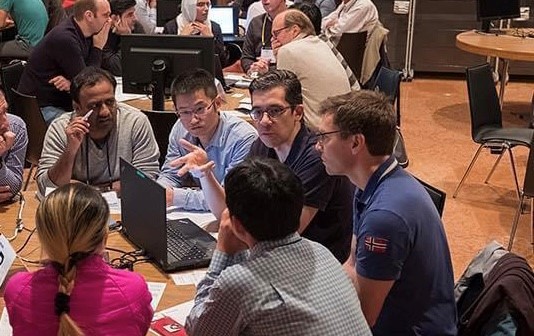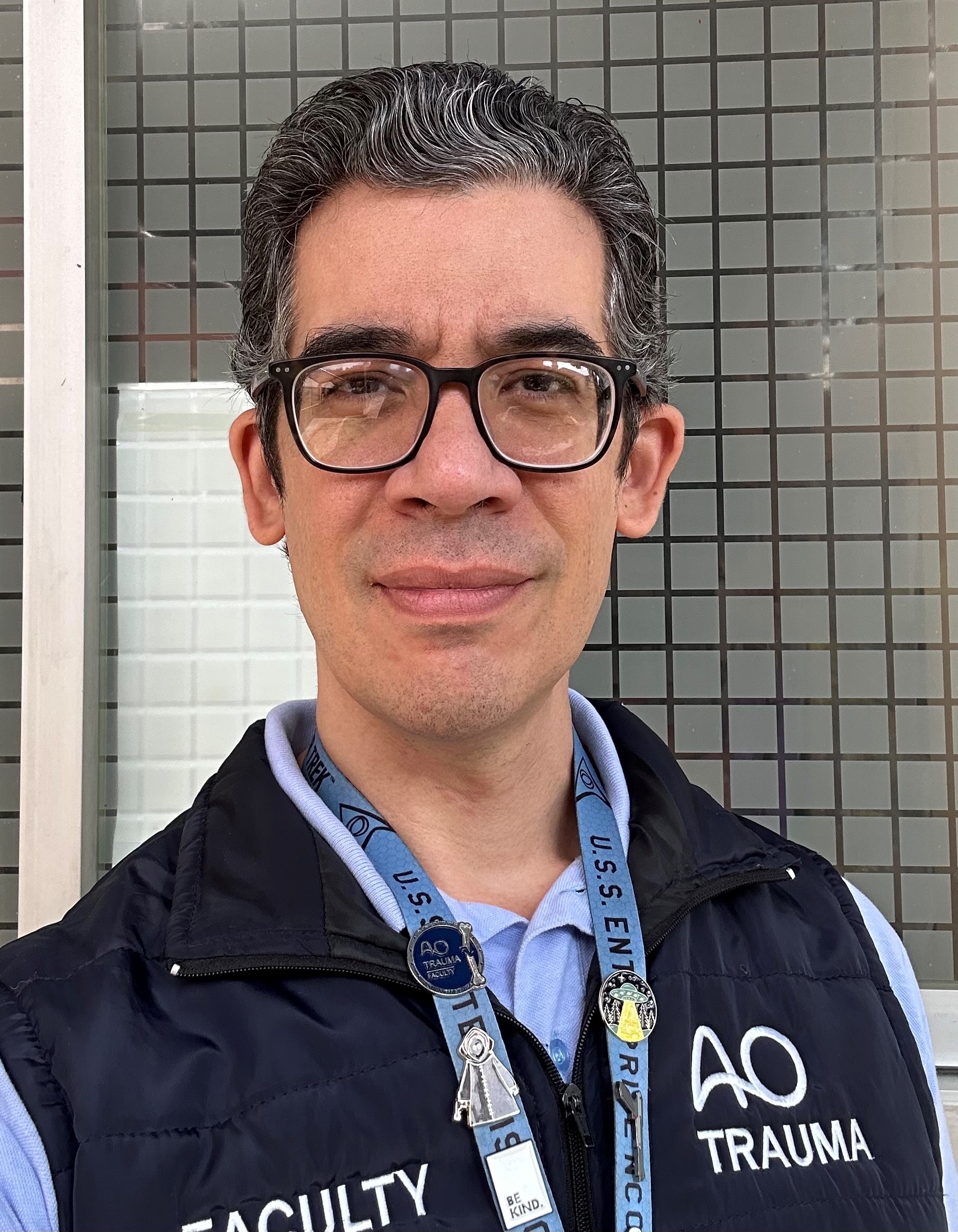Voices for change: Celebrating diversity within the AO

Ensuring fair, transparent pathways for entry into—and advancement within—the AO isn’t an exercise in window dressing or image management for orthopedic and trauma surgeon Pedro Jorba. It’s a moral obligation. Jorba, who heads the pediatric orthopedics department at
Hospital Pediátrico Legaria in Mexico City, Mexico, is helping make that happen as a member of the AO Access Officer and Faculty Selection Processes Task Force.
Jorba would be the first to point his own privilege out: His physician father and biologist mother encouraged his interests and cultivated a “100 percent science-based home environment” but did not pressure him into a career in medicine.
“I was born in upstate New York in the United States, but I grew up and have lived my whole life in Mexico City. My dad is a gynecologist but as I was growing up, I didn’t feel any pressure to go into medicine,” he said. “Both of my parents were always involved in teaching and volunteer work, and I’m sure that helped shape the path I took and the person I am today.”
In school, science came natural to him—and it helped that his parents encouraged him to read and to have a point of view. Still, when it came to choosing a course of university study, Jorba said his path forward wasn’t so clear.
“There are many doctors who have a clear vision when they go into university and they know perfectly well what they want to do. That wasn’t me. I was all over the place during training. The thing I did know was that I wanted to be a surgeon,” he recounted. “It’s funny, the way I realized what I wanted to do with my life: When I was bored, I would always read about fracture care and trauma, whether I was studying internal medicine, nephrology, or whatever. So, I realized, ‘That’s probably what I should do, then.’”
During his residency, Jorba realized the importance of teachers and mentors.
“It’s such a great responsibility and something we don’t think about when we’re in training. When I was a senior resident, I did realize that younger residents looked up to me and depended on me in learning so many things,” he said. “So, while I didn’t seek out or plan to become a mentor, it’s something that happened over the years. I have known so many young surgeons in my professional work and I have been lucky to be able to help them along their professional and personal paths.”

“I think we have an obligation to open doors, to help people along, to point them in the right direction, and help them meet the right people.”
Pedro Jorba
A moral obligation
“Luck” is a word that comes up often as Jorba describes his journey as a clinician and educator.
“I’m convinced that we who have been walking this path for a longer time have been lucky enough to get further along—or to maybe higher positions of authority—have a moral obligation to make things easier for those who come behind us, particularly people who don’t have access to the privilege or helping hands that I and so many of us have had,” he asserted. “I think we have an obligation to open doors, to help people along, to point them in the right direction, and help them meet the right people. If we don’t do that, then who are we?”
Jorba said it’s important to him to cascade that commitment to his work with the AO.
“We like to think that we are an egalitarian, totally just and fair organization, but that’s not always true,” he said. “Something we have seen through AO Access is that there are systemic barriers in place that don’t help people who come from disadvantaged circumstances or who simply belong to an underrepresented group—and as a result, they don’t get the roles they deserve,” he explained. “The way the AO historically selected both faculty members and governance officers did create barriers. This wasn’t done maliciously, but it is a fact. “We only have to look at the people who are not represented in faculty and officer roles to see that something’s wrong and something has to change.”

“It all starts by making people aware that the problem exists and then taking steps to fix it.”
Pedro Jorba
Raising awareness
That’s where the AO Access Officer and Faculty Selection Processes Task Force comes in.
“Our task force has tried to identify these barriers which in many cases are written into the bylaws and processes that we have to follow. It all starts by making people aware that the problem exists and then taking steps to fix it,” he said.
The task force has made steady progress, Jorba said.
“I think our greatest success is that we have managed to bring this issue to the forefront. It’s something that no one talked about and which many people didn’t even think was a real problem,” he added. “They are now thinking about it. I think this issue has been brought out of the shadows and into the light. That’s an important step.”
A fair and credible process
Lending credibility to AO Access is the means by which its volunteer task forces were selected.
“I love the way the task forces were selected,” he said. “This was a volunteer process. We all just submitted our letters of intent and motivation in response to an open and anonymous call.”
Names and other personal identifiers were stripped from respondents’ applications and curricula vitae to ensure an entirely transparent and unbiased selection process.
“When I saw the people who made up our task force, I was very glad to see that this is what we were talking about: people from all over, people who look and think very different from one another,” he exclaimed. “I am sad to admit that when I saw that I had been selected, for just a moment I had a nagging feeling that I was like a token Latin American member. But then I saw that this was a blind process. I think this process proves that if you choose people based only upon what they can and want to do—what they’re good at and what they are passionate about—you will get diverse groups in a natural, organic way, and you won’t need to rely on tokenism to achieve diversity.”
Going forward, Jorba believes the AO must continue working to eliminate barriers and bringing diversity-related issues to the public eye.
“We have made great progress in getting people in the AO to talk about diversity, to look for inclusion, and to make sure it actually happens. But I don’t think this is something that can be left to chance—it will take too long to achieve the diversity and inclusion we want. We need to be active in making things better for underrepresented groups,” he emphasized.

“Studies have shown that underrepresented groups tend to receive inferior care if their health care providers do not represent their demographics.”
Pedro Jorba
‘Invite everyone to the table’
He's optimistic in part because of the AO’s global orientation.
“We really are a global organization. Regional representation is fantastic because steps have been taken to ensure that: There is a built-in rotation all along the regions,” he said. “We have to have talented people from all over—and that is one of the AO’s strengths, so I’m convinced that this can happen. We just have to make sure it happens for all of the underrepresented groups that have not benefited in this way.”
These efforts are crucial in order to ensure the AO’s excellence well into the future.
“We need to be aware that if we do not become more diverse and inclusive, we are depriving ourselves as an organization of some of the best and brightest minds in the world. We have a chance to reach everyone, to get the very best—we cannot shut the door in their faces,” said Jorba. “If we want to grow, if we want to continue to be the best, we need to invite everyone to the table.”
Patients will be the ultimate beneficiaries of a more diverse and inclusive AO community, he explained.
“Studies have shown that underrepresented groups tend to receive inferior care if their health care providers do not represent their demographics,” he said. “The ultimate goal of the AO is to improve patient care. If we want to do that, we have to ensure that health care providers reflect the reality of the populations we serve. If we don’t, then lack of access, inequalities, low standard of care, and all of the other historic injustices these people have faced will persist.”

